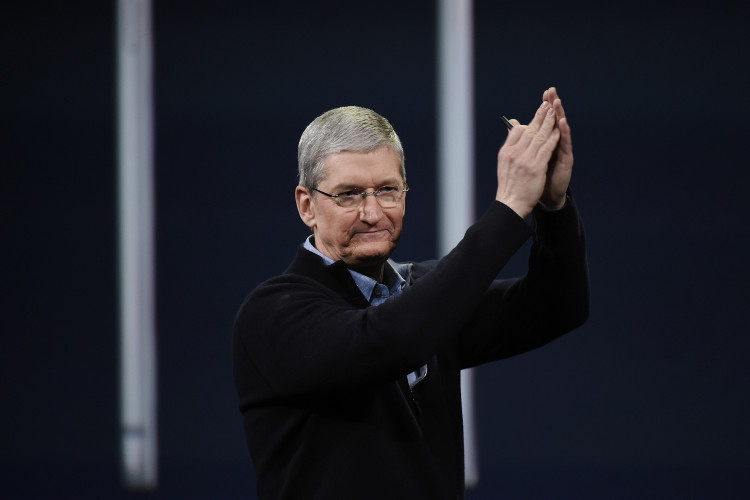Apple Among Giants Due for Foreign Tax Bill Under House Plan

published Nov 2, 2017, 3:59:14 PM, by Lynnley Browning, Laura Davison and Matt Townsend
(Bloomberg) —
Several of the biggest U.S. companies — including Apple and Procter & Gamble — would no longer be able to escape taxes on the trillions in overseas profits they’ve accumulated, under a tax bill released by House Republicans.
Earnings held in cash would be taxed at 12 percent while profits invested in less liquid assets like factories and equipment face a 5 percent rate, according to the legislation released Thursday. Both taxes would be mandatory, not optional, and companies would have as long as eight years to make their payments on an annual basis. The provision would raise an estimated $223 billion over the next decade.
The 12 percent rate is “borderline of being business unfriendly,” said Steven Englander, head of research and strategy at Rafiki Capital Management. “It’s not a game changer, but the changing tone is a disappointment. It’s gone from the way forward for the tax system to a piggy bank to pay for the tax cuts.”
For Bloomberg Intelligence take on ‘Mostly Business-Friendly’ bill, click here
The provision is part of a tax bill that contains sweeping changes for business and individual taxes, pitched by Republicans and the White House as a way to boost job creation and the U.S. economy. By requiring companies to pay taxes on their past overseas profits, the measure would address a loophole of the U.S. corporate code that has allowed multinational firms to hoard their foreign earnings offshore — beyond the government’s reach.
Foreign Stockpiles
U.S. companies have stockpiled as much as $3.1 trillion offshore, according to an estimate by Goldman Sachs in a recent research note. Under current law, the U.S. taxes multinationals on their global earnings but allows them to defer taxes on foreign earnings until they bring them back to the U.S., or “repatriate” them. But doing so is not mandatory.
“Congress has had its eye on that pot of money for so long, for so many things,” said Gordon Gray, director of fiscal policy for the American Action Forum, a right-of-center think tank. “They might as well pay it now and never again.”
For more on the Republicans’ plan and the opposition forming, click here.
The largest stockpiles belong to Apple Inc. at more than $200 billion, followed by Microsoft Corp., Cisco Systems Inc., Alphabet Inc., Oracle Corp. and Johnson & Johnson, according to data compiled by Bloomberg.
“We’ve always been a very strong advocate for comprehensive corporate tax reform,” Apple Chief Financial Officer Luca Maestri said in a telephone interview. “We will need to see what legislation is enacted.”
The Information Technology Industry Council, which represents almost every major tech company, was initially holding its judgment on the proposal, wanting to keep working with lawmakers to shape it. Microsoft, Alphabet and Oracle declined to comment separately.
Rare Opportunity
“If done right, tax reform will place American companies on a level-playing field, increase competition globally, and create more jobs for Americans,” Dean Garfield, the council’s top executive, said in an emailed statement. Tax reform was a “once-in-a-generation opportunity,” he said.
If this provision does become law and these companies bring back their cash stockpiles back to the U.S., it remains to be seen what they will do with it. There’s not enough legitimate acquisition targets for tech giants like Apple or Microsoft to spend all that money, according to Andrew Silverman, an analyst for Bloomberg Intelligence. That means they are likely to pour it into returning cash to shareholders through dividends and share buybacks, he said.
Lower Tax Rate
While global companies based in the U.S. may be disappointed by the tax on overseas profits being higher than expected, they did get the much-desired reduction in the U.S. corporate rate, with it being cut to 20 percent from 35 percent.
For how a cap on income-tax deductions may affect states, click here
“If we are serious about growing the economy, creating jobs and increasing wages for all Americans, this country needs a modernized tax code. It is that simple,” said Jamie Dimon, chairman and chief executive officer of JPMorgan Chase & Co. and chairman of the Business Roundtable The Roundtable is a powerful lobbying group for the largest U.S. companies, including many with overseas cash.
“While the tax reform bill released today deserves close analysis, it is significant progress toward achieving these goals,” Dimon said.
–With assistance from Ye Xie and Emily Chang.To contact the reporters on this story: Lynnley Browning in New York at lbrowning4@bloomberg.net ;Laura Davison in New York at ldavison4@bloomberg.net ;Matt Townsend in New York at mtownsend9@bloomberg.net To contact the editors responsible for this story: John Voskuhl at jvoskuhl@bloomberg.net Kevin Miller, Alexis Leondis
COPYRIGHT
© 2017 Bloomberg L.P







No Comment